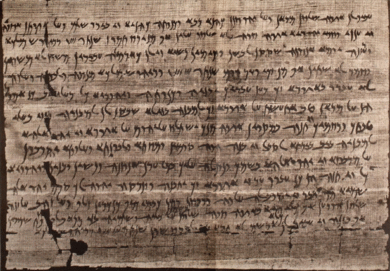
A week ago we saw Stéphanie Anthonioz‘s review of Russell Gmirkin’s Plato and the Hebrew Bible on The Bible and Interpretation. See Plato and the Creation of the Hebrew Bible – review. Today we can read Russell’s response:
I need to refresh my memory with what I read some time ago about the different arguments for the development of “biblical Judaism”, whether it is best understood as a product of the Persian or Hellenistic eras. Anthonioz referred to recent European scholarship, in particular the work of Eckart Otto, which language and costs unfortunately appear hold beyond my reach. Gmirkin does address some obvious problems with the simple trade model (the unlikelihood that ideas discussed among literate elites would necessarily follow trade contacts) but I’d still like to know more about both sides of the discussion.
Anyway, Russell Gmirkin in his response does remind us of one piece of evidence that deserves not to slip from memory or oversight, and that is certainly a strong support for his own view that the Hebrew Bible was the product of the Hellenistic era, that is after the conquests of Alexander around 300 BCE. The emphasis in the following is my own:
In my view, it is methodologically improper to attempt to gain a picture of Judaism in the monarchic (Iron II), Babylonian or Persian eras on the basis of the Pentateuch, since there is no objective external evidence for Pentateuchal writings in pre-Hellenistic times. Quite the contrary, the Elephantine papyri of ca. 450-400 bce give provide strong contemporary evidence for the character of Judaism as practiced late into the Persian Era. These archives of letters (and ostraca) from the Jewish military colony of Elephantine, an Egyptian southern border fortress located just below the First Cataract of the Nile, attest to a thriving Judaism in Egypt with their own temple but no Aaronic priesthood, a Judaism without scriptures, a Judaism which accommodated polytheism, a Judaism with no knowledge of Abraham, Moses, or any other figure known from the Pentateuch or Hebrew Bible (as shown by the absence of these famous figures from the many Jewish names found in the archives). The Jews of Elephantine celebrated a purely agricultural Passover and Days of Unleavened Bread (TAD A4.1) with no associated traditions regarding Moses or Exodus. They possessed a seven day week, but no sabbath of rest, as shown by one ostraca that enjoined an employee to offload a boat full of vegetables on the sabbath on pain of death (TAD D7.16.1-5). These Jews deferred to the authority of Jewish priests from Jerusalem, with whom they consulted on religious matters, but biblical writings never come into play: only what Wellhausen called Oral Torah, authoritative priestly rulings that did not involve written legal codes. The Samarian papyri of Wadi Daliyeh, dating from ca. 375 to 335 bce, at the dawn of the Hellenistic Era, give a similar, though more limited picture: famous names from the Pentateuch are similarly absent. Contrast with the heavy representation of Pentateuchal names in the second century inscriptions from Mount Gerizim or the book of 1 Maccabees, during later times when the biblical text was mined for children’s names. It seems apparent that Judaism prior to the Hellenistic Era, what I would describe as pre-biblical Judaism, was unacquainted with authoritative Mosaic writings or written laws.
Judaism underwent a bold transformation ca. 270 bce, when the Jewish nation reinvented itself with a new theocratic government modeled on the one described in Plato’s Laws; new divine laws ascribed to Moses; new foundation traditions; an approved national literature (Plato, Laws 7.802b-c, 811c-d); and a new cosmic monotheism patterned on that of the Greek philosophers, notably Plato. Judaism as we are accustomed to thinking of it was a product of the Hellenistic Era and Greek learning. The Books of Moses were not so much a product of Judaism as Hellenistic Judaism was a product of the Books of Moses.
That is not to say that there are no traces of pre-biblical Judaism in the biblical Judaism established by the Jewish senate of ca. 270 bce. Plato’s Laws advocated promoting local temples (Plato, Laws 5.738c-d), priesthoods (Plato, Laws 6.759a-b) and traditional religious customs (Plato, Laws 6.759c-d; 8.828a-c) in order to promote the illusion of an ancient and divine authority for their laws (Plato, Laws 7.798a-b), and it was especially in the cultic sphere that we see continuity with older traditions and institutions in the Pentateuch. Although there is no evidence for the body of cultic regulations having existed in written form prior to ca. 270 bce, it probably reflects practices at the temples at Jerusalem and Mount Gerizim in earlier times.
Personally I can’t help feeling that the terms “Judaism” and “Jews” are anachronistic when applied to this time period. I prefer Steve Mason’s preference for the term “Judeans” and wonder if it might be more appropriate to refer to the religion of the Judeans as Yahweh worship or simply the Judean religious practices.
